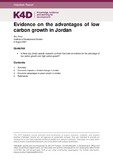| dc.contributor.author | Price, Roz | |
| dc.coverage.spatial | Jordan | en |
| dc.date.accessioned | 2021-09-20T10:12:33Z | |
| dc.date.available | 2021-09-20T10:12:33Z | |
| dc.date.issued | 2021-08-06 | |
| dc.identifier.citation | Price, R.A. (2021). Evidence on the advantages of low carbon growth in Jordan. K4D Helpdesk Report 1035. Institute of Development Studies, DOI: 10.19088/K4D.2021.117 | en |
| dc.identifier.uri | https://opendocs.ids.ac.uk/opendocs/handle/20.500.12413/16847 | |
| dc.description.abstract | There has been a considerable amount of research generally into the benefits associated with low carbon development, showing that it can be synergistic with development priorities – such as job creation, improved public health, social inclusion and improved accessibility (see for example, Gouldson et al., 2018). However, this rapid review finds limited evidence and information around these benefits specifically for the Hashemite Kingdom of Jordan. There has been much interest in green growth in Jordan in the last ten years, particularly as Jordan is seen as having a large renewable energy potential for solar and wind. International organisations have been working with Jordan to develop comprehensive national plans and strategies to encourage green growth investment. Within the Jordanian government, the green growth concept has mainly been promoted by the Ministry of Environment. The World Bank in particular has produced a number of reports that have fed into this review, that explore or touch on green growth in Jordan – however, they themselves recognise that there is a lack of research on the economic and job-generating impacts of a green growth pathway in Jordan, and emphasise the need for further analysis (see specifically Hakim et al., 2017). Many of the green growth statistics referenced are from single reports undertaken a number of years ago – for example, that environmental degradation costs Jordan 2% of its GDP per year comes from a World Bank report written in 2010 and based on data from 2006 (World Bank, 2010). No more recent reviews were found during this rapid review. This review draws on a mixture of academic and grey literature from government and international organisations. | en |
| dc.description.sponsorship | Foreign, Commonwealth & Development Office (FCDO) | en |
| dc.language.iso | en | en |
| dc.publisher | Institute of Development Studies | en |
| dc.relation.ispartofseries | K4D Helpdesk Report;1035 | |
| dc.rights.uri | https://www.nationalarchives.gov.uk/doc/open-government-licence/version/3/ | en |
| dc.subject | Climate Change | en |
| dc.subject | Environment | en |
| dc.title | Evidence on the Advantages of Low Carbon Growth in Jordan | en |
| dc.type | Helpdesk | en |
| dc.rights.holder | © Crown copyright 2021 | en |
| dc.identifier.doi | 10.19088/K4D.2021.117 | |
| dcterms.dateAccepted | 2021-08-06 | |
| rioxxterms.funder | Default funder | en |
| rioxxterms.identifier.project | K4D | en |
| rioxxterms.version | VoR | en |
| rioxxterms.versionofrecord | 10.19088/K4D.2021.117 | en |
| rioxxterms.funder.project | 0986883a-6d0f-4bb8-9c46-5e0682934d65 | en |

